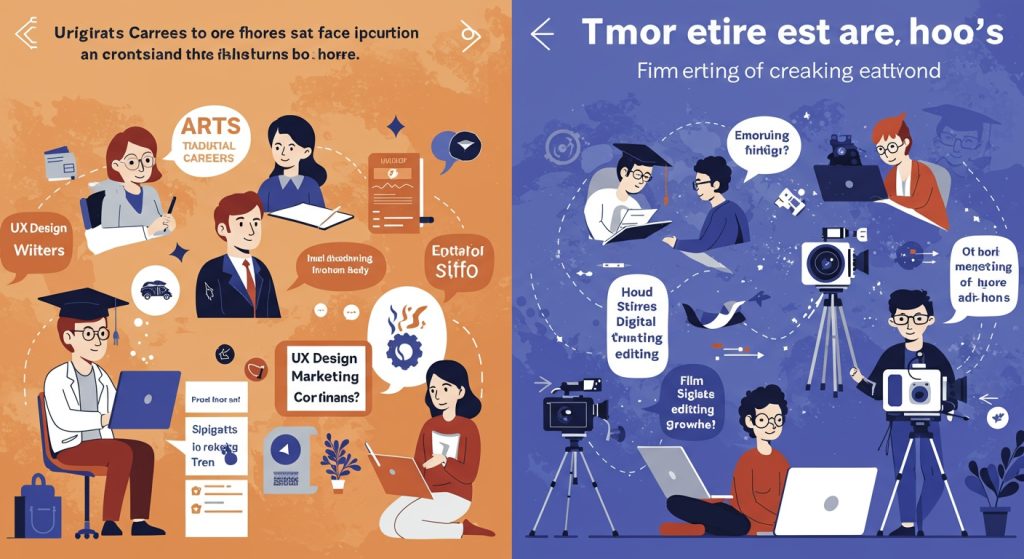Embark on a journey into the thriving world of Computer Science, where demand for skilled professionals is surging, fueled by advancements in AI, blockchain. Cybersecurity. This exploration unveils the high-demand career opportunities awaiting BSc Computer Science graduates in 2025. Discover how roles like AI/ML engineers, data scientists. Cybersecurity analysts are not just jobs. Gateways to shaping the future. We’ll examine the essential skills, burgeoning specializations like quantum computing and edge computing. The curriculum structure designed to equip you with cutting-edge knowledge, preparing you to not only meet industry needs but also to lead innovation.

Decoding the Demand: Why a BSc in Computer Science is Your Ticket to Tomorrow’s Careers
A Bachelor of Science in Computer Science (BSc CS) is more than just a degree; it’s a gateway to a rapidly evolving and highly lucrative job market. The digital age has created an insatiable demand for skilled computer scientists. This trend is projected to intensify as we approach 2025 and beyond. But why is this degree so sought after? It boils down to the foundational knowledge and practical skills you acquire. You learn to think algorithmically, solve complex problems. Create innovative solutions using technology.
Think of it this way: every industry, from healthcare to finance, retail to entertainment, relies heavily on computer systems and software. This reliance translates directly into a demand for professionals who can design, develop, maintain. Secure these systems. A BSc CS equips you with the tools to meet this demand head-on.
High-Growth Career Paths for Computer Science Graduates
The beauty of a BSc CS lies in its versatility. It opens doors to a wide range of specialized career paths. Here are some of the most promising options, with a focus on those experiencing significant growth:
- Software Developer: The backbone of the tech industry. Software developers are responsible for creating, testing. Maintaining applications and systems. Demand is consistently high as businesses continually seek to improve their software offerings and develop new solutions. According to the Bureau of Labor Statistics, the median annual wage for software developers was $127,260 in May 2022.
- Data Scientist: In the age of Big Data, companies are desperate for professionals who can extract meaningful insights from vast datasets. Data scientists use statistical analysis, machine learning. Data visualization techniques to identify trends, predict outcomes. Inform business decisions. This field is projected to grow significantly in the coming years.
- Cybersecurity Analyst: With the increasing frequency and sophistication of cyberattacks, cybersecurity analysts are crucial for protecting sensitive data and critical infrastructure. They monitor networks, identify vulnerabilities. Implement security measures to prevent breaches. The demand for cybersecurity professionals is skyrocketing as organizations prioritize data protection.
- Web Developer: Essential for creating and maintaining websites and web applications. Web developers can specialize in front-end (user interface), back-end (server-side logic), or full-stack (both). As the internet continues to be a primary platform for business and communication, web developers remain in high demand.
- Database Administrator: Responsible for managing and maintaining databases, ensuring data integrity, security. Accessibility. With the increasing volume of data generated by businesses, skilled database administrators are essential for efficient data management.
- Network Architect: Designs and implements computer networks. Network architects are in demand as businesses expand their IT infrastructure and adopt new technologies. They need to interpret the complexities of network security, cloud computing. Network scalability.
- AI/Machine Learning Engineer: Develops and implements AI and machine learning models for various applications, such as image recognition, natural language processing. Predictive analytics. AI is transforming industries, creating high demand for professionals with expertise in this area.
The Skills That Set You Apart: What Employers Are Looking For
A BSc CS provides a solid foundation. Certain skills are particularly valued by employers. These skills go beyond theoretical knowledge and demonstrate your ability to apply what you’ve learned in real-world scenarios.
- Programming Proficiency: Mastering multiple programming languages (e. G. , Python, Java, C++) is essential. Employers often seek candidates with experience in specific languages relevant to their industry.
- Problem-Solving Skills: Computer science is fundamentally about solving problems. You need to be able to break down complex issues into smaller, manageable components and develop creative solutions.
- Data Analysis Skills: The ability to review and interpret data is crucial in many roles, particularly in data science and business intelligence.
- Communication Skills: Being able to effectively communicate technical concepts to both technical and non-technical audiences is highly valued. This includes written, verbal. Presentation skills.
- Teamwork and Collaboration: Most projects involve working in teams. The ability to collaborate effectively, share ideas. Contribute to a common goal is essential.
- Adaptability and Lifelong Learning: The tech industry is constantly evolving. You need to be able to adapt to new technologies and learn continuously throughout your career.
Future Trends Shaping the Computer Science Landscape in 2025 and Beyond
The field of computer science is constantly evolving. Understanding future trends is crucial for staying ahead of the curve. Here are some key trends that are expected to shape the industry in 2025 and beyond:
- Artificial Intelligence (AI) and Machine Learning (ML): AI and ML are transforming industries across the board. From autonomous vehicles to personalized medicine, AI-powered solutions are becoming increasingly prevalent. This trend will continue to drive demand for AI and ML engineers, data scientists. Researchers.
- Cloud Computing: Cloud computing has revolutionized the way businesses store and process data. Cloud platforms like Amazon Web Services (AWS), Microsoft Azure. Google Cloud Platform (GCP) provide scalable and cost-effective solutions for a wide range of applications. Professionals with cloud computing skills will be highly sought after.
- Cybersecurity: As the digital landscape expands, so does the threat of cyberattacks. Cybersecurity will remain a top priority for businesses and governments alike. The demand for cybersecurity analysts, ethical hackers. Security engineers will continue to grow.
- Quantum Computing: While still in its early stages, quantum computing has the potential to revolutionize fields like medicine, materials science. Cryptography. As quantum computers become more powerful and accessible, they will create new opportunities for computer scientists.
- Internet of Things (IoT): The Internet of Things (IoT) refers to the network of interconnected devices that collect and exchange data. From smart homes to industrial automation, IoT is transforming the way we live and work. Professionals with expertise in IoT development, security. Data analysis will be in high demand.
- Edge Computing: Edge computing brings computation and data storage closer to the location where it is needed, improving response times and saving bandwidth. This is particularly crucial for applications like autonomous vehicles, smart cities. Industrial IoT.
Comparing Cloud Computing Providers: AWS vs. Azure vs. GCP
Cloud computing is a cornerstone of modern IT infrastructure. Three major players dominate the market: Amazon Web Services (AWS), Microsoft Azure. Google Cloud Platform (GCP). Understanding their strengths and weaknesses is crucial for making informed decisions about cloud adoption.
| Feature | Amazon Web Services (AWS) | Microsoft Azure | Google Cloud Platform (GCP) |
|---|---|---|---|
| Market Share | Largest market share | Second largest market share | Growing market share |
| Services | Widest range of services | Strong integration with Microsoft products | Leading in data analytics and machine learning |
| Pricing | Complex pricing structure | Competitive pricing | Innovative pricing models |
| Ease of Use | Mature platform with extensive documentation | User-friendly interface, especially for Windows users | Developer-friendly platform |
| Ideal For | Enterprises with diverse needs | Organizations heavily invested in Microsoft technologies | Data-intensive applications and AI/ML projects |
Real-World Applications: How Computer Science Impacts Our Lives
Computer science is not just about code; it’s about solving real-world problems and improving people’s lives. Here are some examples of how computer science is making a difference:
- Healthcare: Computer science is used to develop new diagnostic tools, personalize treatment plans. Accelerate drug discovery. AI-powered systems can examine medical images to detect diseases earlier and more accurately.
- Transportation: Autonomous vehicles are transforming the transportation industry. Computer scientists are developing the algorithms that enable cars to navigate roads, avoid obstacles. Make decisions in real-time.
- Finance: Computer science is used to detect fraud, manage risk. Automate trading. Machine learning algorithms can identify patterns in financial data to predict market trends.
- Education: Computer science is used to create personalized learning experiences, develop educational games. Provide access to online learning resources.
- Entertainment: Computer science is used to create video games, develop special effects for movies. Stream music and video content.
Navigating Your Career Path: The Role of Career Guidance
Choosing the right career path within computer science can be overwhelming. That’s where effective Career Guidance comes in. Career counselors can help you assess your interests, skills. Values. Provide guidance on educational and career options. They can also help you develop a resume, prepare for interviews. Network with potential employers. Seeking professional Career Guidance is a proactive step towards a fulfilling and successful career in computer science.
Many universities offer career services tailored to computer science students. These services often include workshops on resume writing, mock interviews. Networking events with industry professionals. Take advantage of these resources to gain valuable insights and connections.
Don’t underestimate the power of networking. Attend industry conferences, join online communities. Connect with professionals in your field of interest. Networking can open doors to internships, job opportunities. Mentorship relationships.
Conclusion
Looking ahead to 2025 and beyond, a BSc in Computer Science positions you at the forefront of innovation. We’ve explored the high-demand areas like AI, cybersecurity. Cloud computing. It’s clear the digital landscape is rapidly evolving. The future vision involves a world increasingly reliant on intelligent systems and secure data management. To thrive, continuous learning is paramount. Embrace emerging technologies like quantum computing and edge AI; these are the next frontiers. Begin by focusing on specialized certifications in your chosen area and actively participate in open-source projects to build a robust portfolio. Remember, the possibilities are limitless for those who are adaptable and passionate about shaping the future of technology. As noted in articles discussing future career options, exploring various paths and staying ahead of trends is key to success. Career Options After 12th is a good starting point for more insights.
More Articles
Top Computer Science Courses for AI and Machine Learning in 2025
Future Salary Trends: What Will Be the Highest Paying Jobs?
Science Stream Career Paths: What Options Do You Really Have?
Essential Earth Science Courses: Shaping Sustainability Careers for 2025
FAQs
Okay, so a BSc in Computer Science is cool and all. Are the job prospects really that good in, say, 2025? What am I actually looking at?
Absolutely! Think of it this way: everything uses software these days. From your phone to your car to your fridge (maybe even your toaster!). That means companies are constantly searching for talented computer scientists. You’ll be looking at roles like software developer, data scientist, cybersecurity analyst, web developer. Even game developer, just to name a few. Demand is projected to stay high, especially with specializations in things like AI and cloud computing.
What are the skills companies will be drooling over in Computer Science graduates by 2025?
Great question! Beyond the fundamentals (like programming languages), employers are going to be very interested in graduates with expertise in AI and Machine Learning, cybersecurity, cloud computing (AWS, Azure, Google Cloud), data analysis and visualization. Even blockchain technologies. Also, don’t underestimate the importance of soft skills like communication, teamwork. Problem-solving. They’re essential!
AI seems to be everywhere. How does a Computer Science degree help me get into that field?
A Computer Science degree is perfect for jumping into AI! It provides the foundation in algorithms, data structures. Programming that you’ll need. Then, you can specialize through electives, projects. Even postgraduate studies in AI-related areas like machine learning, natural language processing, or computer vision. You’ll be building the brains behind the bots, essentially!
Cloud computing – is it just a fad, or should I actually pay attention to it?
Definitely pay attention! Cloud computing is not a fad. It’s become the backbone of how most businesses operate. Knowing how to develop, deploy. Manage applications on platforms like AWS, Azure, or Google Cloud is a seriously valuable skill. It’s all about scalability, efficiency. Cost-effectiveness for businesses. They’re willing to pay for it.
What kind of salary can I realistically expect after graduating with a BSc in Computer Science?
That’s the money question! It varies depending on location, company size, specific role. Your experience. Generally, you can expect a very competitive starting salary. Entry-level positions can range from $60,000 to $90,000 (USD) per year in many developed countries. And that’s just the starting point! With experience and specialization, your earning potential grows significantly.
Besides the technical stuff, what else should I focus on during my degree to make myself more employable?
Don’t just bury your head in textbooks! Get involved in extracurricular activities like coding clubs, hackathons. Open-source projects. Internships are gold! They give you real-world experience and a chance to network. Also, work on your communication and teamwork skills – you’ll be collaborating with others on projects constantly. , show you’re not just a coder. A well-rounded professional.
Will a Computer Science degree still be relevant in 2025, considering how quickly technology changes?
Absolutely. While specific technologies come and go, the fundamental principles of computer science – problem-solving, algorithmic thinking, logical reasoning – remain constant. A good Computer Science program teaches you how to learn and adapt to new technologies, which is the most vital skill in this rapidly evolving field. So, yeah, it’s a solid investment in your future!



